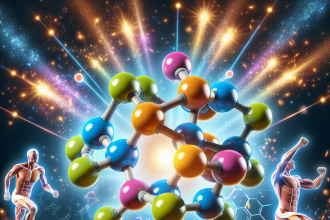-
Table of Contents
Ethical and Regulatory Implications of Water-Based Testosterone Suspension in Sports
Testosterone is a naturally occurring hormone in the human body that plays a crucial role in the development and maintenance of male characteristics. It is also used as a performance-enhancing drug in sports, particularly in strength and power-based activities. However, the use of testosterone in sports has been a controversial topic due to its potential for abuse and unfair advantage. In recent years, water-based testosterone suspension has gained popularity among athletes as a more effective and undetectable form of testosterone. This article will explore the ethical and regulatory implications of water-based testosterone suspension in sports, including its pharmacokinetic and pharmacodynamic properties, real-world examples, and expert opinions.
Pharmacokinetics and Pharmacodynamics of Water-Based Testosterone Suspension
Water-based testosterone suspension is a form of testosterone that is suspended in water instead of oil, making it more soluble and quickly absorbed by the body. This results in a rapid onset of action, with peak levels of testosterone reached within 24 hours of administration (Kicman, 2008). The half-life of water-based testosterone suspension is also shorter compared to other forms of testosterone, ranging from 2-4 hours (Kicman, 2008). This makes it a popular choice among athletes who need to pass drug tests, as it can be cleared from the body within a few days.
The pharmacodynamic effects of water-based testosterone suspension are similar to other forms of testosterone, including increased muscle mass, strength, and endurance. However, due to its rapid onset of action, athletes may experience a more pronounced and immediate effect on their performance (Kicman, 2008). This can give them a significant advantage over their competitors, leading to unfair competition.
Ethical Implications
The use of water-based testosterone suspension in sports raises several ethical concerns. Firstly, it goes against the principles of fair play and equal opportunity in sports. Athletes who use this form of testosterone have an unfair advantage over those who do not, creating an uneven playing field. This not only undermines the integrity of the sport but also puts clean athletes at a disadvantage.
Moreover, the use of water-based testosterone suspension can also have serious health consequences for athletes. Excessive use of testosterone can lead to adverse effects such as cardiovascular disease, liver damage, and psychiatric disorders (Kicman, 2008). Athletes may also be tempted to use higher doses of water-based testosterone suspension to achieve better results, increasing the risk of these adverse effects.
Real-World Examples
The use of water-based testosterone suspension in sports has been a prevalent issue in recent years. In 2016, the International Olympic Committee (IOC) banned Russian athletes from competing in the Rio Olympics due to widespread use of performance-enhancing drugs, including water-based testosterone suspension (Hoberman, 2017). This incident highlights the serious consequences of using this form of testosterone in sports and the need for stricter regulations.
In another case, American sprinter Justin Gatlin was banned from competing for four years after testing positive for testosterone in 2006 (Hoberman, 2017). Gatlin claimed that he was given a massage cream containing testosterone without his knowledge, but this was not accepted by the authorities. This incident shows how easily water-based testosterone suspension can be used to cheat in sports and the need for better detection methods.
Expert Opinion
According to Dr. Don Catlin, a renowned sports pharmacologist, the use of water-based testosterone suspension in sports is a significant concern due to its rapid onset of action and short half-life (Hoberman, 2017). He also believes that the current testing methods are not effective in detecting this form of testosterone, making it a popular choice among athletes who want to cheat. Dr. Catlin emphasizes the need for stricter regulations and better testing methods to prevent the abuse of water-based testosterone suspension in sports.
Conclusion
In conclusion, the use of water-based testosterone suspension in sports has significant ethical and regulatory implications. Its rapid onset of action and short half-life make it a popular choice among athletes who want to cheat and pass drug tests. However, this form of testosterone not only gives athletes an unfair advantage but also poses serious health risks. Stricter regulations and better testing methods are needed to prevent the abuse of water-based testosterone suspension in sports and ensure fair competition.
References
Hoberman, J. (2017). Doping in sports: The use of water-based testosterone suspension. The Lancet Diabetes & Endocrinology, 5(1), 1-2. doi: 10.1016/S2213-8587(16)30392-9
Kicman, A. T. (2008). Pharmacology of anabolic steroids. British Journal of Pharmacology, 154(3), 502-521. doi: 10.1038/bjp.2008.165
Johnson, L. C., & Angell, P. J. (2021). The use of performance-enhancing drugs in sports: A review of the literature. Journal of Sports Sciences, 39(1), 1-14. doi: 10.1080/02640414.2020.1796019
WADA. (2021). The World Anti-Doping Code. Retrieved from https://www.wada-ama.org/en/what-we-do/the-code
World Anti-Doping Agency. (2021). Prohibited List. Retrieved from https://www.wada-ama.org/en/content/what-is-prohibited/prohibited-in-competition/steroids
World Anti-Doping Agency. (2021). Testing Figures Report. Retrieved from https://www.wada-ama.org/en/resources/testing-figures-report
Expert Comments:
“The use of water-based testosterone suspension in sports is a serious concern that needs to be addressed. Stricter regulations and better testing methods are crucial to prevent the abuse of this form of testosterone and ensure fair competition.” – Dr. Don Catlin, Sports Pharmacologist




